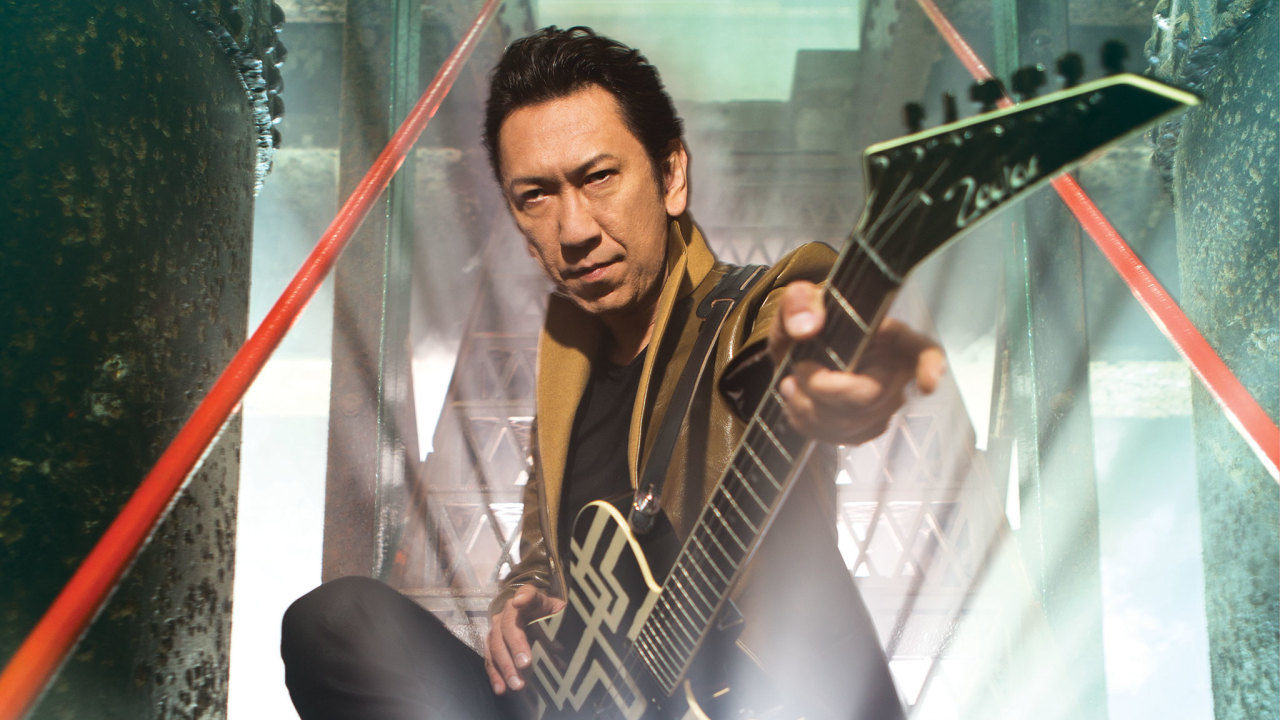“I was walking down the street and there was a huge music shop”, says Tomoyasu Hotei. “In the window was a poster of Marc Bolan from T-Rex, and I remember seeing him and thinking, ‘Why does he look so pleased with himself?’ Then I looked down and I saw he was holding an electric guitar…”
39 years on from that moment, Hotei is a huge star in his own right. He’s sold 40,000,000 albums. He’s performed with David Bowie and The Rolling Stones. He’s changed the Japanese music industry. And now, aged 53, he’s kicking off an international career. “Life is short and you only live once,” he tells Classic Rock, speaking at London’s Lexington venue ahead of an intimate showcase performance. “The world is big.”
The guitarist, producer, composer and actor grew up with his Korean father and Japanese mother in the city of Takasaki, about an hour away from the capital city of Tokyo. As a child he practiced piano, sticking with the instrument for seven years before switching to the electric guitar at the age of 14 after discovering that Bolan poster.
Hotei wasted no time forming a band. In 1979 his amateur group Blue Film entered a high school music contest, where they finished second. As fate would have it the winning act was fronted by his future bandmate Kyosuke Himuro, but Hotei didn’t hang around long enough to develop the relationship. The young punk was expelled before graduation after a teacher warned him about the trouble he would get into if he didn’t cut his hair, to which his response was, “Jesus had long hair!”
After getting kicked out of school Hotei moved to Tokyo to pursue music as a career, but a phone call from Himuro brought the runaway teen back to his hometown, where the two became friends and started the seminal J-Rock band Boowy. Inspired by their glam rock heroes Bowie and Bolan, the punk-fuelled rock‘n’roll of the Ramones, and the angular post-punk of bands like Gang Of Four, Boowy went into the studio to record their debut album Moral in 1982. Hotei was just 19.
“It sounded terrible”, Hotei says. “I was a huge music collector and I had almost 1000 LPs on vinyl at that time. I knew which sounds were good and which were bad. We made a bad one. We didn’t know how to record, or how to play even. But it was good for us because we were frustrated from the beginning and we wanted to make better music and improve our sound.” They did, and pretty soon Boowy became major stars in Japan.
“Now the Japanese music industry is huge”, Hotei explains. “But at that time we were the first rock band to do a proper tour of Japan. We were also the first Japanese rock band to sell a million records with Beat Emotion in 1986, and after we’d been a band for six years we’d sold millions and millions of records. We changed the Japanese music industry.”
Boowy’s success inspired a whole generation of Japanese bands, and their influence on the ‘90s Japanese alternative rock boom can’t be emphasised enough. But a rift between Hotei and Himuro caused the band to break at the height of their fame in 1988, after which record companies spent the next decade scouring the nation in the hope of finding a new Boowy.
Hotei went on to forge an even more lucrative career as a solo artist. He’s since released 15 studio albums, over 30 singles, six compilation albums, eight live albums, and sold around 40 million records in Japan alone.
Outside of his own projects Hotei has also composed music for Hollywood movies (Fear and Loathing in Las Vegas), written songs for video games (Nintendo), and collaborated with some of the biggest names in the music business. As if that wasn’t enough, at the age of 50 the singer-songwriter relocated to London with his family, with a view to pursuing his dream of an international career in music. The UK, Hotei believes, is the still the country where rock music came from, and where it thrives.
“I was satisfied making music and doing business in Japan”, he says, “because my market over there was so huge. But as I was approaching 50 I asked myself if I was still following my dream. So I spoke to my wife and my staff in Japan about coming to the UK to break the international market. People know my music thanks to the Kill Bill collaboration, but they don’t know my name, and over here I have more of a chance of reaching a worldwide audience outside of Japan.”
The Kill Bill collaboration Hotei is referring to is the Battle Without Honor or Humanity, which he originally wrote for the Japanese yakuza movie New Battles Without Honor or Humanity in 2000. The piece was introduced to Western audiences three years later in Quentin Tarantino’s Kill Bill Vol. 1.
“Tarantino called my office to say that he’d watched that movie with his friend Robert Rodriguez. He loved the song and he called to ask if he could use it for his film. I said, ‘That song was for a different movie, so can I write you another song?’ He said, ‘No, no, I want that one.’ So that’s how it came to be in Kill Bill. I’m so happy that he used my music in that film. It such a great movie, and Tarantino is my favourite director.”
Tarantino isn’t the only high profile fan Hotei’s got. He opened up for David Bowie at the Nippon Budokan arena in Tokyo in 1996, and The Thin White Duke invited him on stage to play guitar on All The Young Dudes, the tune Bowie famously donated to Mott The Hoople in 1972. The performer talks about that night being “the biggest moment” of his life, but it wasn’t an isolated occurrence. Last year he was also invited to join The Rolling Stones on stage during the final show of their tour in Japan, where he lent his guitar skills to Respectable in front of some 53,000 fans at the Tokyo Dome. How does he do it?
“I was in Japan for a very long time, and I was kind of the only one inspired by European music and playing to a Japanese audience. Many artists came from countries like America, the UK and all over Europe and asked, ‘Who is the hottest Japanese musician or artist?’ Everybody said, ‘Hotei’. That gave me many chances. If I was over here there would’ve been no chance, but because it was in Japan I did it.”
Now he’s over here. But if Hotei is scared about re-starting his career in a country where, for the large part, nobody knows his name, he doesn’t show it.
“For me, staying in Japan and staying safe was scarier. I enjoy playing these small shows. This was my choice – nobody else’s. My next ambition is to bring my music from person to person, and show them my guitar playing. I have the music, and I have my team, so now I just want to start.”
You can’t argue with a confident man, and the help of some famous friends certainly helps. Hotei’s last album — aptly titled New Beginnings (2014) — featured Iggy Pop on two of the tracks, and his next release promises even more big name collaborations.
“The album is nearly finished. We just recorded a track with Matt Tuck from Bullet For My Valentine, and hopefully there’ll be another one or two collaborations on there.” Could this be the record that finally gives Hotei the international recognition he’s been dreaming of? We’ll have to wait and see. Either way he shows no signs of slowing down any time soon.
“Guitar is the only thing I can do”, he says, as if the thought of doing anything except music has never even entered his mind. “I try to be a good dad, and a good husband and a good man. But I’m a guitarist, and that’s the only way I know how to live.”
Bonus Video
TeamRock’s video team spoke to Hotei on the day of the Lexington show. He told us about new beginnings, about the freedom of the guitar, and what it’s like when people think your most famous song is a cover.

